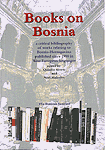
|
 |
 |
Selected Longer Reviews
Postcards from the Grave
|
By Suljagic, Emir
|
Saqi in association with The Bosnian Institute, London,
2005,
196 pages,
Price: 12.99 Pound Sterling
Shelf mark: 949.702'4 [testimonies]
|
Why did I survive while all of my friends died?
Ten years after the Srebrenica massacre, Emir Suljagic's painful and beautiful account of the siege, Postcards from the Grave, is the first from a Bosnian, says Tim Judah. Exactly 10 years ago, Emir Suljagic, a young Bosnian Muslim from Srebrenica, met General Ratko Mladic. The general had just taken Srebrenica and was, as we were soon to find out, busy organising the slaughter of up to 8,000 men and boys from the place that the UN Security Council had declared a 'safe area'. The general looked at Suljagic's identity card, asked him what he was doing and then said he could go. To this day, that moment has tortured Suljagic.
'I survived because Mladic felt like God that day,' writes Suljagic in his remarkable memoir of life in the besieged town. 'He had absolute power to decide over life and death. I used to dream about him for months, reliving the encounter ... I feared I would go mad trying to explain to myself why he spared me, who was just as insignificant to him as my friends must have been whose execution he ordered. I never found an answer.' Ten years after the massacre and 60 years after the liberation of Auschwitz, it is chilling to recognise in Suljagic's words the syndrome of survivor's guilt which was identified among Holocaust survivors.
From the spring of 1992 until July 1995, Srebrenica and the surrounding enclave were besieged by General Mladic's men. It was a cruel siege and its end was crueller still. Indeed, the UN's war crimes tribunal in the Hague has declared unequivocally that the massacre that took place after the war was genocide.
For that reason, large numbers of books have been written about Srebrenica, but all of them by foreigners. Suljagic, now a journalist in Sarajevo, has written the first account of the siege to be published in English by a Bosnian who lived through it. Just to bear witness would be enough but Suljagic writes beautifully. His stories of life in the besieged enclave are not marred by a rancour, which could have made this survivor's tale just a stream of angry consciousness. Indeed, Suljagic writes with the skill of an accomplished novelist but at the same time, for those who are interested, gives us much detail not just about life under siege but also facts which doubtless will be repeated in histories yet to be written.
Suljagic was 17 when the siege began. He taught himself English and became an interpreter for the UN. This was what saved his life when Mladic asked him what he was doing. For that reason, he was then moved out of the town and did not have to trek across Serb-held territory to get out. Thus, what is most fascinating about his book is not encounters with the Serbs, in a face-to-face sense, but, rather, his account of surviving the siege.
Some of this is intensely personal. 'I noticed that hunger had completely altered my personality,' he writes. 'From a boy who before the war used to be shy and reserved, I had become aggressive and unscrupulous. What I saw scared me, but I quickly realised that it was a matter of survival.'
Events and scenes described are very focused. Suljagic tells how the defence of the town was organised and describes his admiration, if not liking, for Naser Oric, its military leader. Then comes his disappointment when suspicions arose that Oric doubled up as Srebrenica's mafia boss.
Suljagic's story is by no means a self-pitying tale of passive victims betrayed only by the outside world. He gives us the full story or at least, one suspects, the fullest one he can to date without getting a bullet in the head.
At one point, he describes how when rushing forward to get humanitarian aid dropped over the enclave, his uncle is shot dead. Nothing happened to the killer, though, because of his connections with leaders of the municipality: 'There were no laws and public authority was based on mutual balance of power.' Even today, says Suljagic, there is 'no point' in naming the murderer. Another man who is murdered dies after leading a protest against the theft of aid by local officials.
One of the most moving scenes describes how people would come from across the enclave to get an opportunity to speak on the town's ham radio to family and friends elsewhere. 'No one ever said, "I love you." Never did an open love declaration pass through those wires, aerials and cables. And yet nowhere and never had there been more love concentrated on one spot than in that half-dark, grey room with bars on the windows.' Suljagic has written a very fine book indeed.
This review appeared in The Observer (London), 3 July 2005
Back to Books on Bosnia

|
|
 |

Books on
Bosnia:A database of 379 book reviews and 3741 books held by the Institute:
|
|